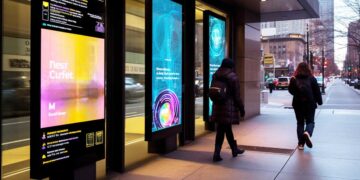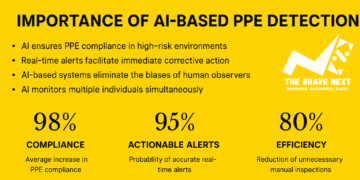Imagine this: You’re at work on a construction site, and a tiny piece of metal suddenly flies toward your face. Or you’re cycling downhill at high speed, and a bug crashes right into your eye. Whether you’re on a job site, hiking trail, or inside a lab, your eyes are always at risk.
Your eyes are one of the most sensitive parts of your body. A small accident can lead to a lifetime of vision issues—or even blindness. That’s why wearing protective eye glasses is not just smart. It’s necessary.
Let’s explore how the right protective eyewear can save your eyes, what features matter most, and how to avoid common mistakes when buying them.
Why Protective Eye Glasses Matter
1. Protection Against Flying Debris
Worksites, factories, or even home improvement projects often involve dust, sharp particles, or chemicals. These can quickly get into your eyes. One quick splash or flying shard is enough to cause serious damage.
Protective eye glasses create a strong barrier. They stop dust, debris, or tiny particles from harming your eyes.
2. Safety from UV Rays
Many people think sunglasses are only for fashion. But UV rays from the sun can damage your eyes, just like they damage your skin. Over time, UV exposure can lead to cataracts, macular degeneration, and other eye diseases.
Safety sunglasses with UV protection block these harmful rays. They reduce your risk while keeping your vision clear outdoors.
3. Reducing Glare and Improving Vision
When driving, skiing, fishing, or working under bright lights, glare can blur your vision. This can be risky and tiring.
Glasses with anti-glare or polarized lenses help you see better in bright conditions. They reduce reflection and eye strain, helping you stay focused and safe.
Top Features to Look for in Protective Eye Glasses
Not all safety glasses are the same. Here’s what you should check before buying:
1. ANSI Z87.1 Certification
This is the most important feature. ANSI-rated protective eye glasses meet strict safety standards. The Z87.1 rating means the glasses can handle impact and protect you from flying objects.
Always look for the ANSI stamp on the lens or frame before buying.
2. Durable and Shatterproof Lenses
Your lenses should be tough. Look for polycarbonate lenses, which are lightweight but strong. They are impact-resistant and don’t break easily.
Some lenses even come with scratch-resistant coatings to stay clear for longer.
3. Anti-Fog Coating
If you work in humid or high-temperature places, foggy glasses can be a real problem. It can blur your vision and increase the chances of accidents.
Choose anti-fog protective glasses that maintain clear vision even in tough environments.
4. Polarized or Tinted Lenses
For outdoor use, polarized lenses reduce glare from water, roads, or glass. Tinted lenses also help cut brightness and improve clarity.
These features are especially useful for drivers, athletes, and outdoor workers.
5. Comfortable Fit and Adjustable Features
Safety glasses should sit comfortably on your face. If they don’t, you’ll likely take them off—and that defeats the purpose.
Look for adjustable nose pads, temple tips, or wraparound designs. A snug fit protects better and feels better too.
Where You Need Protective Eye Glasses
These glasses are useful in many situations—not just factories or labs. Here are some everyday and job-related use cases:
1. Construction and Industrial Work
This is one of the top industries where eye injuries happen. Sparks, chemicals, flying nails, and dust are everywhere.
Protective glasses with ANSI certification are often required by law in construction zones.
2. Laboratory and Medical Settings
Chemical splashes and harmful light exposure are major risks in labs.
Healthcare professionals also use safety glasses to avoid infections and fluid splashes during surgeries or procedures.
3. Sports and Outdoor Activities
Cycling, shooting, skiing, and hiking all involve risks to your eyes. From UV rays to dust or impact from sports balls—protective sunglasses with polarized lenses help keep athletes safe.
4. Driving and Motorcycling
Sun glare and dust can be distracting and dangerous. Safety sunglasses reduce glare and improve visibility, especially during sunrise or sunset driving.
Motorcyclists especially benefit from wind and debris protection.
5. Home Improvement Projects
Using power tools, mowing the lawn, or painting? Small particles, paint fumes, or debris can hurt your eyes.
Even weekend DIYers need safety eyewear to prevent accidents in the garage or backyard.
Common Mistakes People Make When Buying Safety Glasses
It’s easy to pick the wrong pair when you don’t know what to look for. Avoid these common errors:
1. Choosing Fashion Over Function
Some people buy regular sunglasses thinking they’ll offer protection. But fashion sunglasses don’t meet safety standards. They may not protect you from impact or chemicals.
2. Ignoring the Fit
Loose or tight glasses are not just uncomfortable—they’re unsafe. If glasses don’t fit well, particles can still get in. Or worse, you may remove them altogether.
Make sure your glasses fit your face snugly and comfortably.
3. Buying Non-Certified Glasses
If the glasses don’t have ANSI or EN166 certification, they may not be reliable. Don’t take chances with uncertified gear—you may be risking your eyesight.
4. Going for Cheap Imitations
Sure, saving money feels good—but not at the cost of your eyes. Cheap, low-quality protective glasses break easily, scratch faster, and may not block UV rays.
Invest in proper safety eyewear. It pays off in the long run.
How to Care for Your Protective Glasses
To make your glasses last longer and work properly:
- Clean them regularly with a soft microfiber cloth.
- Store them in a hard case when not in use.
- Avoid touching the lenses with dirty hands.
- Check for damage often. If scratched or cracked, replace them immediately.
Taking care of your eyewear helps them protect you better and longer.
Stay Safe with Safety Eye Glasses
At Safety Eye Glasses, we know how important eye protection is. That’s why we offer high-quality, certified protective eye glasses and prescription safety sunglasses at affordable prices.
Our eyewear is built with durable materials, advanced lens coatings, and meets the highest safety standards like ANSI Z87.1. Whether you need anti-fog glasses for the lab or polarized sunglasses for driving—we’ve got your eyes covered.
Don’t wait for an accident to start protecting your vision.
Final Thoughts
Wearing protective eye glasses is one of the easiest ways to prevent life-changing injuries. Whether you’re working, playing, or just enjoying the outdoors, your eyes deserve the best protection.
Remember: your eyesight is priceless—but safety glasses are not. Choose smart. Stay safe.
























